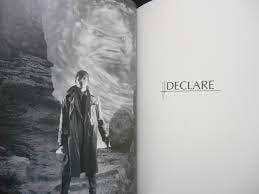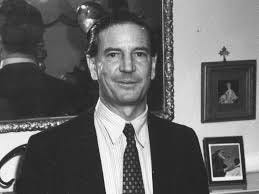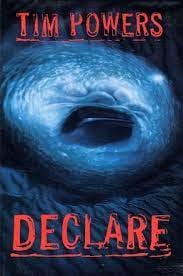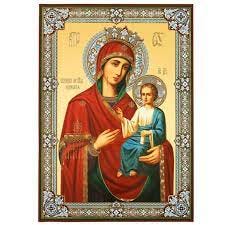Declare, Andrew Hale (Part 1)
Where wast thou when I laid the foundations of the earth? declare, if thou hast understanding.
“It was said once to me that it is inexpedient to write the names of strangers concerned in any matter, because by the naming of names many good plans are brought to confusion.”1
— Rudyard Kipling, Kim
The last book I read in the Year of Our Lord 2023, was Tim Powers’ Declare, published in 2001. This was actually a reread for me as I read the book for the first time back in 2018 or so. It has become one of my favorite books of all time. For those of you who have not read Declare, this is the description from the back cover of the William Morrow Imprint of HarperCollins (2013) edition:
“As a young double agent infiltrating the Soviet spy network in Nazi-occupied Paris, Andrew Hale finds himself caught up in a secret, even more ruthless war. Two decades later, in 1963, he will be forced to confront again the nightmare that has haunted his adult life: a lethal unfinished operation code-named Declare.
From the corridors of Whitehall to the Arabian desert, from postwar Berlin to the streets of Cold War Moscow, Hale’s desperate quest draws him into international politics and gritty espionage tradecraft — and inexorably drives Hale, the fiery and beautiful Communist agent Elena Teresa Ceniza-Bendiga, and Kim Philby, mysterious traitor to the British cause, to a deadly confrontation on the high glaciers of Mount Ararat, in the very shadow of the fabulous and perilous Ark.”2
Dean Koontz, another famous Catholic author, wrote a blurb on the front of the same edition:
“Dazzling…a tour de force, a brilliant blend of John le Carré spy fiction with the otherwordly.” 3
Powers’ approach to writing is to weave supernatural explanations around historical events, without purposefully changing anything in recorded history. His goal is to write a story so convincing, that the reader wonders if the version Powers provides is the true one that the history books ignore. This is the way Powers sneaks past the watchful dragons of his, mostly secular, readership and explores the sacramental nature of reality.
I often tell people that Declare is the spiritual successor of C. S. Lewis’ Ransom Trilogy: Out of the Silent Planet, Perelandra and especially, That Hideous Strength. Powers is a huge admirer of Lewis and Lewis’ influence can be seen throughout his books. Declare is Powers’ attempt to recast Lewis’ That Hideous Strength in a new setting, namely Russia and Turkey during the height of the Cold War. Both Declare and That Hideous Strength involve making deals with evil cosmic entities to gain power and knowledge at the expense of mind, body, and soul.
For those of you who follow me on Twitter.com, you might remember my thread exploring the meaning of names in fantasy fiction. In that thread, I gave the example of Brendan Doyle, from Tim Powers’ classic time-travel novel, The Anubis Gates. I briefly explored the meaning behind the name, Brendan Doyle, how it connects to the plot, and how Powers’ uses it in his world-building. Between this post and the next, I want to do an in-depth exploration of the various meanings behind the name of the protagonist of Declare, Andrew Hale. There will be spoilers, so be warned. Part one will be exploring “Andrew” and I will address “Hale” in part two.
Buckle in and, “declare if thou hast understanding.”
The name “Andrew” derives from the Greek, Andreas, which means “manly, masculine, of or for a man; strong; stubborn," from anēr (genitive andros) "man" (from PIE root *ner- (2) "man").”4 Therefore, I would argue that the name “Andrew” refers to“Man” in the general sense, meaning that the character of Andrew Hale could possibly be a representative of all of humanity. Both Andrew Hale and the main human antagonist, Kim Philby, were together meant to be a rafiq or representative to the tribe of djinn on the top of Mount Ararat on behalf of the Rabkrin, the ultra secret agency within the Soviet Union. Here Philby describes the jewel that protects his mind from the djinn:
“What has the jewel got to do with air travel?”
“I’m not going to give it to you people either. B-but what it d-does is — it constitutes a rafiq, it makes the bearer an emissary, with d-diplomatic immunity to any r-r-wrath from the powers that prevail…up high, from roughly a thousand feet above sea-level on up…to the m-moon, I suppose.”5
(The moon is also a reference to medieval cosmology)
The thing to remember with Tim Powers is that he likes to turn orthodox concepts on their heads in order to flesh out their opposites. Dr. George Grant, in his essay “Sacramental Fairy Tales: The Speculative Fiction of Tim Powers”, he describes Powers’ fiction as heterodoxy foiling for orthodoxy.
“As strange as this may ring to the modern ear, it was among the commonest of chimes to the medievalist and, thus, becomes for Powers the primary literary and theological motif in each of his books. Phil Dick's heterodoxy foils Chesterton's orthodoxy and finds full fruition in Powers' sacramentalism.”6
For example, Andrew is the name of Jesus’ first apostle, St. Andrew, referred to as The First Called by Eastern Christians. St. Andrew was first a disciple of St. John the Baptist. He was also the brother of St. Peter and is the patron of fishermen, Russia and parts of the Middle East. Relating to fishermen, St. Matthew’s writes in his gospel (ch. 4:18-20):
“And Jesus walking by the sea of Galilee, saw two brethren, Simon who is called Peter, and Andrew his brother, casting a net into the sea (for they were fishers). And he saith to them: Come ye after me, and I will make you to be fishers of men. And they immediately leaving their nets, followed him.”7
Powers creates an upside-down St. Andrew in the character of Andrew Hale. Hale is recruited at the age of seven by the British secret service to serve “The Crown” shortly after his receiving First Communion. Like St. Andrew the First Called, Hale was selected from the very beginning by a power greater than himself, to be their emissary and agent in the world. He has a profound faith in Christ right from the beginning but unlike St. Andrew, he lapses into atheism after his “godfather” James Theodora, transferred him out of his Jesuit prep school into a cheaper, secular alternative. The remains of Hale’s faith are transferred to England and to The Crown.
Christ called St. Andrew to be a “fisher of men” leading to the salvation of many through his preaching, miracles, and martyrdom. Hale, while working as a double agent for England, became a fisher of monsters, the djinn, leading to their destruction. In fact, the theme of fishing, fish, boats and the Ark itself are constant themes throughout the book.
There is also an apocryphal story of St. Andrew needing to rescue St. Matthias from a city of cannibals, called The Acts of Andrew and Matthias In the City of the Man-Eaters. In this story, St. Matthias get captured by cannibals and has his eyes plucked out. The Lord tells St. Andrew to make the long journey to St. Matthias in as little as three days because that was when St. Matthias was to be eaten. St. Andrew says in response:
““My Lord, I shall not be able to accomplish the journey thither before the limited period of the three days; but send Thine angel quickly, that he may bring him out thence: for thou knowest, Lord, that I also am flesh, and shall not be able to go there quickly’. And He says to Andrew: ‘Obey Him who made thee, and Him who is able to say in a word, and that city shall be removed thence, and all that dwell in it. For I command the horns of the winds, and they drive it thence. But rise up early, and go down to the sea with thy disciples, and thou shalt find a boat upon the shore, and thou shalt go aboard with thy disciples.’ And having said this, the Saviour again said: ‘Peace to thee, Andrew, along with those with thee!’ And He went into the heavens.
And Andrew having risen up early, proceeded to the sea along with his disciples; and having come down to the shore, he saw a little boat, and in the boat three men sitting.”8
The point being that St. Andrew knows he, himself is not capable of making such a journey in three days but he trusts in God’s power and might to get him there. In contrast, Andrew Hale is given a talisman, a chunk of black stone “broken from one of the mindless stone ghosts of the djinn”. Hale is not capable of facing the djinn on his own, but he desires to be like a god, commanding them like the sorcerers of old. He convinces himself to get rid of the stone in a masterclass example of rationalization:
“But I don’t want to repel the djinn, he told himself, trying to concentrate in the gusty, rocking jeep bed. And even if I should want to, soon, that will be — would be — a mistake. I need to make contact with the creatures that live on this mountain — to destroy them, but first to see them! Even if I could keep this stone hidden and somehow damped, the fact of having it in my pocket might be an overpowering temptation to use it, if this operation becomes too robust.
The stone was tugging away more strongly now — he had to use both hands to hold on to it, bracing himself with his feet — and he told himself that it would soon be repelled with such force that even if he wedged it against the floor it would drag the jeep to a wheel-spinning halt.
I have to let it go, he thought with cautious satisfaction — nobody can blame me.” 9
Hale’s pride, compared to St. Andrew’s humility and obedience, is what led to him partaking in a diabolical communion with the djinn in eating his comrades. Hale becomes the cannibal.
"Hale felt his subsumed identity flex with deliberate effort, and then McNally’s leg was a crushed ruin tumbling separate from the body — and in the instant before he recoiled away from this incorporeal participation Hale tasted the hot blood and shattered bone and tone khaki.
The djinn were eating the men in the sky, and Hale, sharing their identity because he had aligned himself with their peculiar frequency, was doing it with them, in them.”10
Finally, there is the tradition of St. Andrew being the patron of finding good Catholic spouses for single women. According to Catholicculture.org,
“Saint Andrew's Night is a traditional time of "oracles" for girls who pray to the Saint for a husband and wish to receive some visible assurance that their prayers have been heard. The origin of this custom is explained by the name Andrew (best translated as "manly" or "man") and by the fact that from ancient times he has been called the "most kindly of saints." Others have found the reason for this patronage in the antiphon of the Divine Office on Andrew's Day: Concede nobis hominem justum (Grant us a good, just man). Whichever the reason, the fact is that Saint Andrew was invoked in all countries by young women looking for a husband. Much of this lore is still practiced in Europe.”11
The female protagonist, Elena Teresa Ceniza-Bendiga, pleaded with the Blessed Virgin Mary to get her out of Russia alive.
“I told the Virgin: ‘If you will intercede with your Son to get me out of Russia alive, I vow that on my —’ Elena frowned. “I wanted to give this time, selfishly wait until my youth was safely gone, I think — I said, ‘I vow that on my fortieth birthday at high noon I will light a candle for you right here in Moscow, at St. Basil’s Cathedral in Red Square, in the heart of your enemy’s Kingdom, the way you put your heel on the serpent’s head.’ And I promised her that I would —"
After several seconds Philby shook his head and raised his eyebrows. “What’s the harm of being honest now, here? On your deathbed?”
“Oh God,” Elena signed. “I promised her that I would be a chaste wife from then on. I didn’t want to embark on it too soon, there was a young man — gone now —”
“Chaste,” said Philby impatiently, “do go on. I don’t need to hear about your tiresome young men. Whom were you going to be married to, in your old age?” Philby himself was then thirty-six.
“I vowed that I would not marry until then, and that — that I would consider marrying — I was delirious — that I would take whomsoever she might elect to show me, after I had lit the candle. You see? I was humbly placing the selection in her hands. I think I imagined Prince Myshkin.”12
Andrew Hale was the man the Virgin chose for Elena.
Andrew Hale is, deliberately or not, modeled after St. Andrew. Powers weaved the patronages of St. Andrew into the character of Andrew Hale but flipped them in the ways I stated above. This is a consistent theme with Powers’ fiction and provides a helpful key to interpreting his works.
In part two, I will explore the many meanings of the name “Hale” and how Powers uses them in his masterpiece, Declare.
Powers, Tim (2001). Declare (2013 William Morrow ed.). HarperCollins Publishers.
Ibid.
Ibid.
Online Etymological Dictionary (n.d.). Andrew. In Online Etymological Dictionary. Retrieved February 20, 2024 from https://www.etymonline.com/word/Andrew#etymonline_v_13414
Powers, T. (2001). Declare (2013 William Morrow ed.). HarperCollins Publishers.
Grant, G. (May, 2001). Sacramental Fairy Tales: The Speculative Fiction of Tim Powers. Stirling Bridge Newsletter.
Douay-Rheims Bible Online (n.d.). Gospel According to St Matthew Chapter 4. In Douay-Rheims Bible Online. Retrieved February 20, 2024 from https://www.drbo.org/chapter/47004.htm
Roberts, A. & Donaldson, J. (Eds.). (n.d.). Ante-Nicene Fathers (Vol. 8). WM. B. Eerdmans Publishing Company.
Powers, T. (2001). Declare (2013 William Morrow ed.). HarperCollins Publishers.
Ibid.
Catholic Culture (n.d.). Catholic Activity: Feast of St. Andrew, November 11. In Catholic Culture. Retrieved February 20, 2024 from https://www.catholicculture.org/culture/liturgicalyear/activities/view.cfm?id=1204
Powers, T. (2001). Declare (2013 William Morrow ed.). HarperCollins Publishers.









Elena Teresa Ceniza-Bendiga? Wasn't a main character in The Anubis Gates surnamed Ashbless as well?